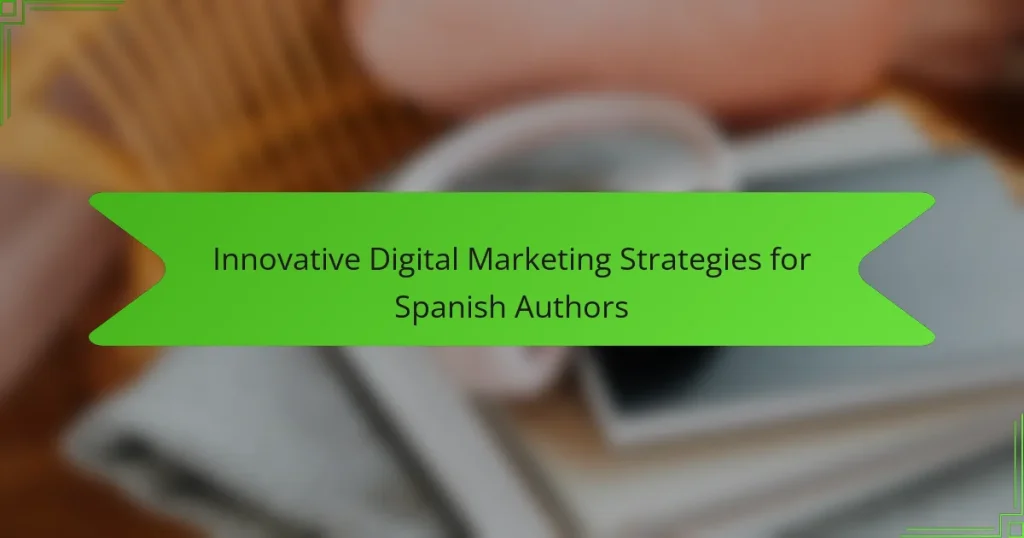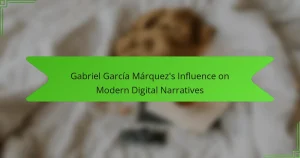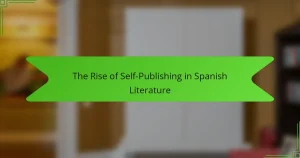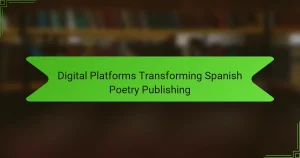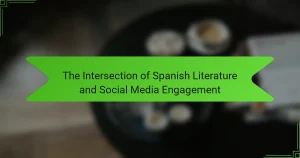Spanish authors face the challenge of standing out in a competitive literary market. Effective strategies include leveraging social media platforms like Instagram and TikTok, optimizing content for search engines, and utilizing personalized email marketing. Engaging storytelling and cultural insights enhance audience connection, while data analytics inform targeted campaigns. By adopting these innovative digital marketing approaches, Spanish authors can significantly improve their visibility and reader engagement.
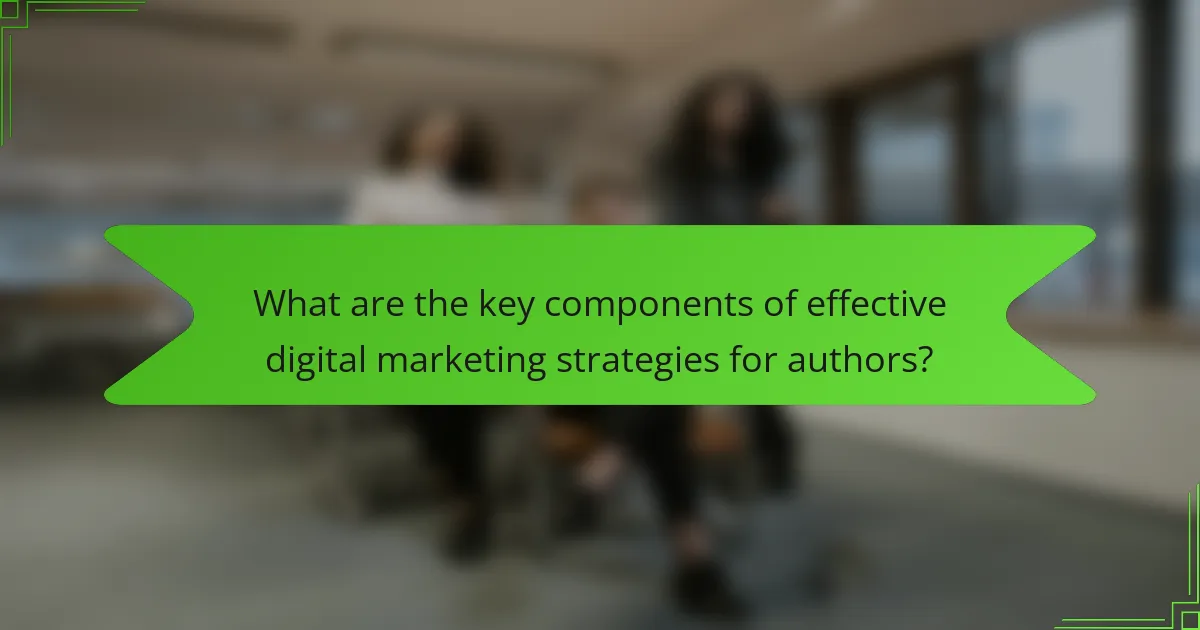
What are the key components of effective digital marketing strategies for authors?
Effective digital marketing strategies for Spanish authors include leveraging social media, engaging with readers through email newsletters, optimizing content for search engines, and utilizing book promotion platforms. These components help authors build a strong online presence and connect with their audience.
Social media channels like Instagram and Twitter allow authors to share insights and updates, fostering community interaction. Email newsletters enable direct communication, offering exclusive content or promotions to loyal readers. Search engine optimization enhances visibility, ensuring that potential readers discover their work easily. Book promotion platforms provide targeted advertising opportunities, reaching specific demographics interested in Spanish literature.
By integrating these strategies, Spanish authors can effectively enhance their visibility and engage their target audience.
How do social media platforms impact marketing for Spanish authors?
Social media platforms significantly enhance marketing for Spanish authors by expanding their reach and engagement. These platforms allow authors to connect directly with readers, showcase their work, and build a personal brand.
Utilizing targeted advertising on platforms like Facebook and Instagram can yield higher visibility for new releases. Authors can leverage analytics tools to understand audience preferences, tailoring their content accordingly.
Engagement through interactive posts, such as polls or Q&A sessions, fosters community and loyalty among readers. This direct interaction is a unique attribute of social media that traditional marketing lacks.
Moreover, collaborations with influencers can amplify an author’s message, reaching diverse audiences. This innovative strategy not only increases exposure but also enhances credibility within the literary community.
What role does content marketing play in promoting literary works?
Content marketing significantly enhances the visibility of literary works by connecting authors with their target audiences. Spanish authors can utilize innovative digital strategies to promote their books effectively. Social media platforms serve as powerful tools for engaging readers and building communities around literary themes. Email marketing campaigns can nurture reader relationships, offering exclusive content and updates. Collaborations with influencers expand reach and introduce works to new audiences. Additionally, creating compelling content such as author blogs or podcasts can establish authority and deepen reader connections. These strategies collectively foster a supportive environment for literary promotion.
Which digital tools are essential for authors in managing their marketing efforts?
Essential digital tools for authors managing marketing efforts include social media platforms, email marketing services, content management systems, and analytics tools. These tools enhance outreach, audience engagement, and performance tracking.
Social media platforms like Facebook and Instagram enable targeted advertising. Email marketing services, such as Mailchimp, facilitate direct communication with readers. Content management systems, like WordPress, streamline website updates. Analytics tools, such as Google Analytics, provide insights into audience behavior and campaign effectiveness.
Using these tools effectively can significantly boost an author’s visibility and sales.
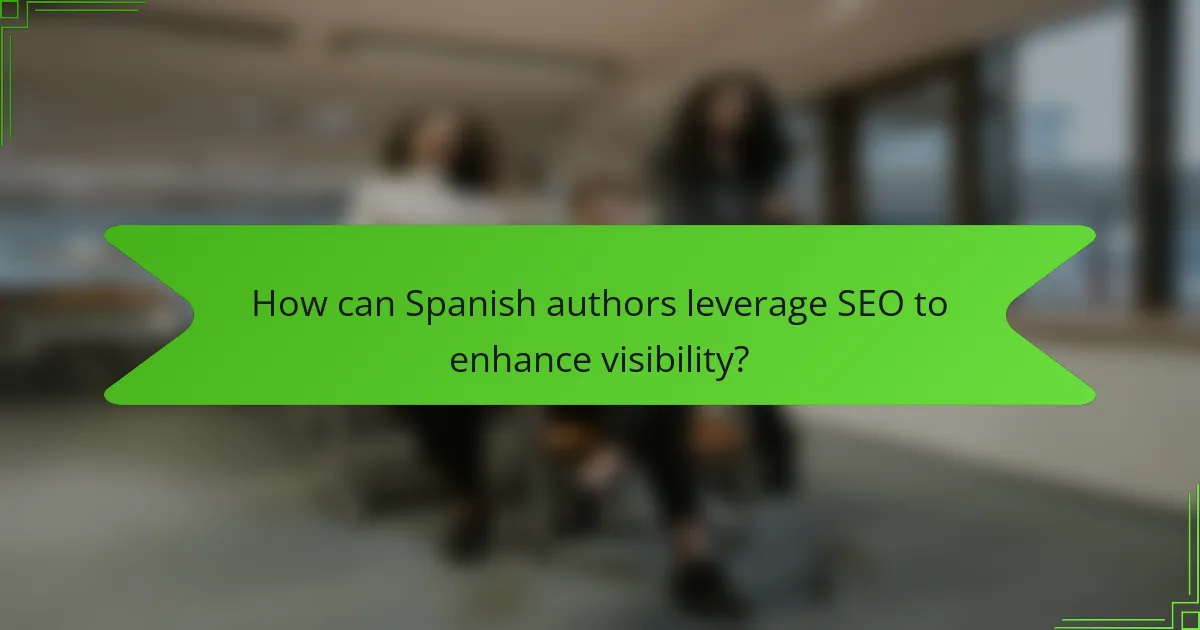
How can Spanish authors leverage SEO to enhance visibility?
Spanish authors can enhance visibility through effective SEO strategies. Focusing on keyword optimization is essential; using relevant terms can improve search rankings. Creating quality content that resonates with target audiences builds engagement and increases organic traffic. Utilizing social media platforms for promotion allows authors to reach wider audiences and drive more website visits. Collaborating with influencers can amplify visibility and credibility within niche markets. Regularly updating content keeps websites fresh and relevant, which search engines favor.
What keyword strategies are most effective for Spanish-language content?
Effective keyword strategies for Spanish-language content include localized keyword research, leveraging cultural nuances, and optimizing for voice search. Focus on long-tail keywords that resonate with the target audience. Additionally, use synonyms and variations to capture diverse search intents. Implementing these strategies enhances visibility and engagement for Spanish authors.
How does local search optimization differ across Spanish-speaking regions?
Local search optimization varies significantly across Spanish-speaking regions due to cultural, linguistic, and technological differences. For instance, regional dialects affect keyword usage, impacting search intent and content relevance. Additionally, local competition and consumer behavior differ, necessitating tailored strategies. Understanding these nuances is essential for effective digital marketing.
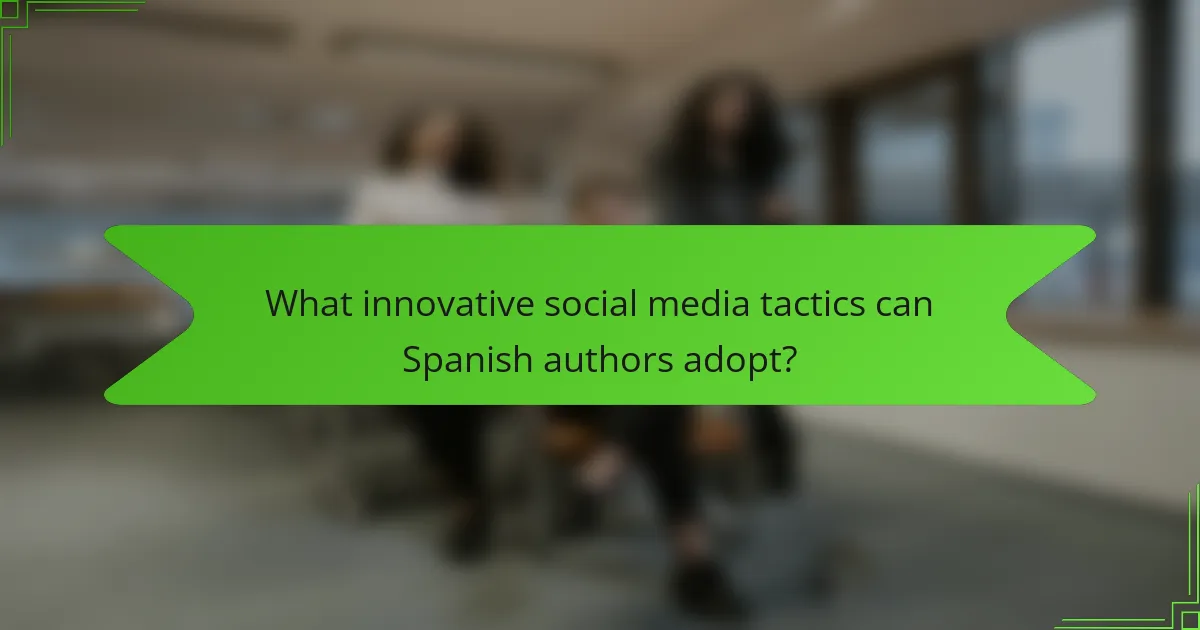
What innovative social media tactics can Spanish authors adopt?
Spanish authors can adopt innovative social media tactics by leveraging interactive content, engaging storytelling, and targeted collaborations. Utilizing platforms like Instagram and TikTok allows for creative visual narratives, enhancing audience connection. Additionally, hosting live Q&A sessions fosters real-time engagement, while strategic partnerships with influencers can expand reach. Emphasizing authenticity in communication builds trust and loyalty among readers.
How can authors utilize Instagram and TikTok for book promotion?
Authors can effectively utilize Instagram and TikTok for book promotion by creating engaging visual content and leveraging trends. Both platforms allow authors to showcase their personality and connect with readers.
On Instagram, authors can use stories, reels, and posts to share behind-the-scenes looks at their writing process, book launches, and reader interactions. Utilizing hashtags can increase visibility and reach.
TikTok offers a unique opportunity for authors to create short, captivating videos that highlight key themes or characters from their books. Participating in challenges and trends can attract a wider audience.
Engaging with followers through comments and direct messages fosters a community around the author’s work, enhancing loyalty and interest in future releases.
What are the benefits of engaging with readers through live streaming?
Engaging with readers through live streaming offers numerous benefits for Spanish authors. It fosters real-time interaction, enhancing reader connection and loyalty. Authors can showcase their personality, making their work more relatable and engaging. Live streaming also allows for immediate feedback, helping authors understand audience preferences and improve their content. Additionally, it can expand their reach by attracting new followers who discover them through shared live sessions. This innovative strategy can create a vibrant community around their work, ultimately driving book sales and increasing visibility in the market.

Which email marketing strategies yield the best results for authors?
Email marketing strategies that yield the best results for authors include personalized content, segmented lists, and engaging subject lines. Personalized content increases open rates by addressing readers directly, while segmented lists ensure that messages are tailored to specific audience interests. Engaging subject lines capture attention, leading to higher click-through rates.
Additionally, incorporating storytelling techniques can enhance emotional connection, making newsletters more compelling. Authors should also analyze metrics regularly to refine strategies based on reader feedback and engagement levels. This continuous improvement leads to more effective email campaigns.
How can segmentation improve email campaign effectiveness?
Segmentation enhances email campaign effectiveness by tailoring messages to specific audience groups. This approach increases engagement rates, as recipients receive content that resonates with their interests and needs. For Spanish authors, segmentation allows for targeted promotions based on genre preferences, reading habits, or demographic factors. Personalized emails can lead to higher open and click-through rates, ultimately boosting book sales and reader loyalty. Effective segmentation strategies include analyzing subscriber data, testing different content types, and refining audience profiles over time.
What types of content should authors include in their newsletters?
Authors should include diverse content types in their newsletters to engage readers effectively. Key content types are:
1. **Author Updates** | Share recent achievements, book releases, or events.
2. **Exclusive Content** | Provide sneak peeks of upcoming works or bonus chapters.
3. **Insights and Tips** | Offer writing advice, marketing strategies, or industry trends.
4. **Reader Engagement** | Include polls, Q&A sections, or feedback requests.
5. **Curated Recommendations** | Suggest books, articles, or resources relevant to readers’ interests.
6. **Personal Stories** | Share personal anecdotes or experiences related to writing journeys.
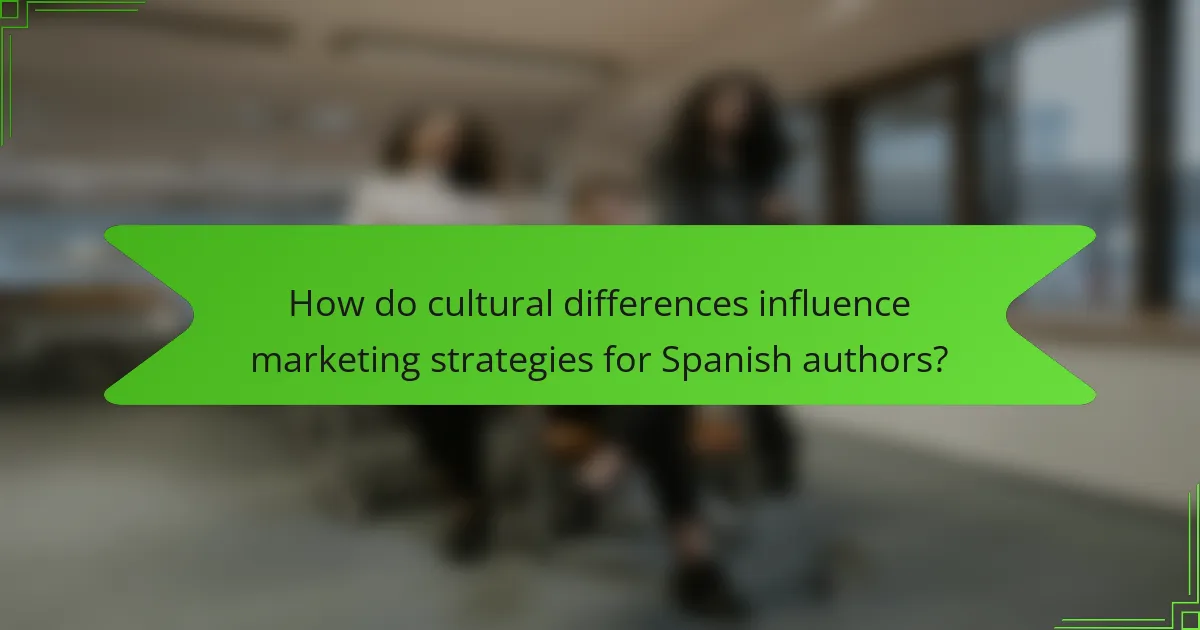
How do cultural differences influence marketing strategies for Spanish authors?
Cultural differences significantly shape marketing strategies for Spanish authors by influencing messaging, imagery, and audience engagement. Understanding local customs enhances relatability, while language nuances improve communication effectiveness.
For instance, Spanish authors can leverage regional variations in dialect and cultural references to connect deeply with specific audiences. This tailored approach fosters brand loyalty and encourages word-of-mouth promotion.
Moreover, incorporating cultural elements in digital campaigns can resonate well with target demographics, driving higher engagement rates. Utilizing social media platforms popular in Spain, such as Instagram and Twitter, allows authors to reach wider audiences while respecting cultural sensitivities.
In summary, adapting marketing strategies to align with cultural differences is crucial for Spanish authors aiming to succeed in diverse markets.
What are the unique challenges faced by authors in Spain versus Latin America?
Spanish authors face unique challenges compared to their Latin American counterparts, primarily due to market dynamics and cultural nuances. In Spain, authors often contend with a saturated market and established literary traditions, making it difficult to stand out. Conversely, Latin American authors may encounter issues related to distribution and visibility in a diverse landscape with varying readership preferences.
Digital marketing strategies must adapt to these challenges. Spanish authors can leverage social media platforms to engage with local audiences, while Latin American authors might benefit from collaborations with regional influencers to enhance their reach.
Additionally, the economic context differs; Spanish authors often have more access to resources for marketing and publishing, whereas Latin American authors may rely more on grassroots efforts. Understanding these distinctions is crucial for effectively navigating the literary scene in both regions.
How can authors adapt their messaging for different Spanish-speaking audiences?
Authors can adapt their messaging for different Spanish-speaking audiences by considering cultural nuances and regional dialects. Tailoring content involves understanding local customs, preferences, and linguistic variations. For example, using specific idioms or references relevant to a particular country can enhance relatability. Additionally, leveraging social media platforms popular in specific regions can improve engagement. Testing messaging through A/B campaigns can provide insights into audience preferences, allowing for further refinement. Ultimately, a deep understanding of the target demographic’s values and communication styles is essential for effective outreach.
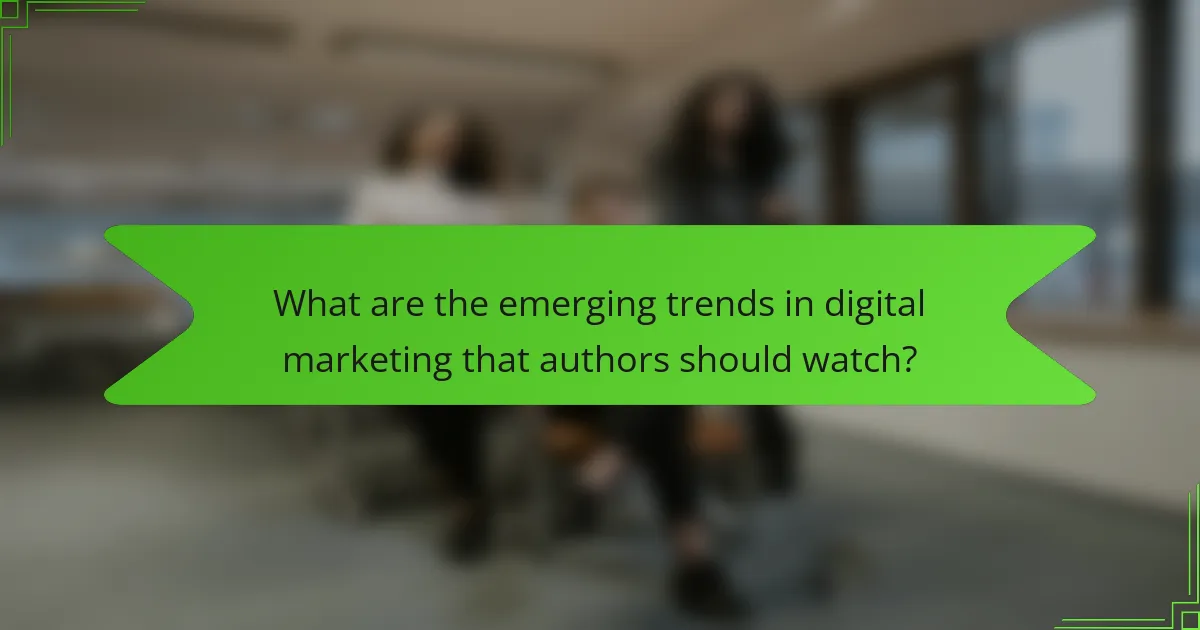
What are the emerging trends in digital marketing that authors should watch?
Emerging trends in digital marketing for Spanish authors include leveraging social media platforms, utilizing video content, and embracing personalized marketing. These strategies enhance engagement and reach diverse audiences effectively.
Social media platforms like Instagram and TikTok are essential for building author brands. Video content, such as book trailers or live readings, captures attention and fosters connections. Personalized marketing through targeted email campaigns increases reader loyalty and sales.
Incorporating data analytics allows authors to understand audience preferences better. Collaborations with influencers can amplify visibility and attract new readers. These innovative strategies position Spanish authors for success in a competitive landscape.
How is artificial intelligence changing the landscape of book marketing?
Artificial intelligence is revolutionizing book marketing for Spanish authors by enabling personalized strategies and data-driven insights. AI tools analyze reader preferences, allowing authors to target specific demographics effectively.
Additionally, AI-driven content creation tools assist in generating engaging marketing materials. These innovations enhance social media campaigns and email marketing efforts, increasing visibility and reader engagement.
Furthermore, AI algorithms optimize pricing strategies by analyzing market trends, ensuring competitive pricing. This adaptability helps Spanish authors reach wider audiences and improve sales performance.
In summary, AI transforms book marketing through personalization, content generation, and dynamic pricing, fostering growth for Spanish authors in a competitive landscape.
What role do influencer partnerships play in promoting books?
Influencer partnerships significantly enhance book promotion for Spanish authors. These collaborations leverage the influencer’s audience to create authentic engagement and expand reach. Influencers can provide unique attributes, such as personal recommendations and reviews, which resonate with potential readers. This strategy often results in increased visibility and sales, as influencers foster trust among their followers. As a result, Spanish authors can effectively tap into niche markets and build a loyal readership through targeted influencer marketing campaigns.
What are some common pitfalls to avoid in digital marketing for authors?
To avoid common pitfalls in digital marketing, Spanish authors should focus on understanding their target audience, utilizing social media effectively, and maintaining consistent branding. Neglecting these areas can hinder visibility and engagement.
One major mistake is failing to analyze audience demographics and preferences, which can lead to irrelevant content. Additionally, underestimating the power of social media platforms can limit outreach. Lastly, inconsistent branding across platforms can confuse potential readers and dilute the author’s identity.
What best practices can Spanish authors implement for successful digital marketing?
Spanish authors can enhance their digital marketing success by focusing on innovative strategies. Utilizing social media platforms effectively, engaging with audiences through interactive content, and leveraging email marketing campaigns are essential practices.
Additionally, creating a strong personal brand helps in building trust and recognition. Collaborating with influencers and participating in online events can expand reach and visibility. Finally, analyzing data and adjusting strategies based on audience feedback ensures continuous improvement and relevance in the digital landscape.
